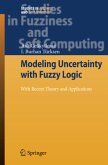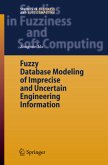Fuzzy Logic in Action: Applications in Epidemiology and Beyond, co-authored by Eduardo Massad, Neli Ortega, Laécio Barros, and Cláudio Struchiner is a remarkable achievement. The book brings a major paradigm shift to medical sciences exploring the use of fuzzy sets in epidemiology and medical diagnosis arena. The volume addresses the most significant topics in the broad areas of epidemiology, mathematical modeling and uncertainty, embodying them within the framework of fuzzy set and dynamic systems theory.
Written by leading contributors to the area of epidemiology, medical informatics and mathematics, the book combines a very lucid and authoritative exposition of the fundamentals of fuzzy sets with an insightful use of the fundamentals in the area of epidemiology and diagnosis. The content is clearly illustrated by numerous illustrative examples and several real world applications. Based on their profound knowledge of epidemiology and mathematical modeling, and on their keen understanding of the role played by uncertainty and fuzzy sets, the authors provide insights into the connections between biological phenomena and dynamic systems as a mean to predict, diagnose, and prescribe actions. An example is the use of Bellman-Zadeh fuzzy decision making approach to develop a vaccination strategy to manage measles epidemics in São Paulo.
The book offers a comprehensive, systematic, fully updated and self- contained treatise of fuzzy sets in epidemiology and diagnosis. Its content covers material of vital interest to students, researchers and practitioners and is suitable both as a textbook and as a reference. The authors present new results of their own in most of the chapters. In doing so, they reflect the trend to view fuzzy sets, probability theory and statistics as an association of complementary and synergetic modeling methodologies.
Written by leading contributors to the area of epidemiology, medical informatics and mathematics, the book combines a very lucid and authoritative exposition of the fundamentals of fuzzy sets with an insightful use of the fundamentals in the area of epidemiology and diagnosis. The content is clearly illustrated by numerous illustrative examples and several real world applications. Based on their profound knowledge of epidemiology and mathematical modeling, and on their keen understanding of the role played by uncertainty and fuzzy sets, the authors provide insights into the connections between biological phenomena and dynamic systems as a mean to predict, diagnose, and prescribe actions. An example is the use of Bellman-Zadeh fuzzy decision making approach to develop a vaccination strategy to manage measles epidemics in São Paulo.
The book offers a comprehensive, systematic, fully updated and self- contained treatise of fuzzy sets in epidemiology and diagnosis. Its content covers material of vital interest to students, researchers and practitioners and is suitable both as a textbook and as a reference. The authors present new results of their own in most of the chapters. In doing so, they reflect the trend to view fuzzy sets, probability theory and statistics as an association of complementary and synergetic modeling methodologies.








